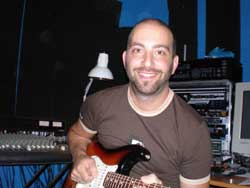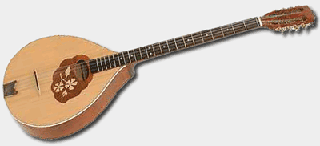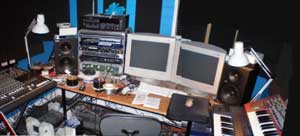Saki Kaskas Interview: From Greek Folk Music to Metal and Need for Speed (Oktober 2006)
Interview Credits
Interview Subject: Saki Kaskas
Interviewer: Michael Naumenko
Editor: Michael Naumenko, Simon Elchlepp
Coordination: Michael Naumenko
Interview Content
Michael: Hi, Saki! Thank you very much for taking your time to speak with us today. Firstly, we wish to say that we’re really charmed with your music – it’s marvelous!
Saki Kaskas: Thank you very much! I’m glad you enjoy my work, and I’m honored to give you this interview.
Michael: Your full name is really interesting (Theodosius Kaskamanidis). I guess the roots of it aren’t German - most likely Greek?
Saki Kaskas: Your guess is correct. My parents are both Greek.
Michael: Can you tell us a bit a bit about yourself and your musical background?
 Saki Kaskas: I was born in Krefeld, Germany, in 1971. My parents were working there because there were no opportunities in Greece at the time. Shortly after I was born, the whole family (my parents and three older sisters) moved to Vancouver, Canada. I was one year old.
Saki Kaskas: I was born in Krefeld, Germany, in 1971. My parents were working there because there were no opportunities in Greece at the time. Shortly after I was born, the whole family (my parents and three older sisters) moved to Vancouver, Canada. I was one year old.
I started to play the guitar when I was 15. I practiced 5 hours a day and in 2 years I was in my first band, Omnibol. We were a rock band and we gained some notoriety around the Vancouver music scene.
In 1993, we broke up. At this time I started to play in various bands. I played in a Greek folk band, a heavy metal band, a cover band, a ‘power trio’ rock band and in a guitar duet. I also played sessions for commercials and such.
In 1994, I joined the Heavy Lounge. This was an instrumental band and we played progressive rock with some leanings towards jazz, funk and metal. The keyboard player was Jeff van Dyck, who was working for Electronic Arts at the time. He now composes music for the Total War video game series out of Australia.
In 1996, Jeff got me a contract for Need For Speed. I already had a bunch of rock and metal tunes that he thought would fit well with the game. Soon after that I became a full time composer for EA, and I composed music for NHL 97 & 98, Need For Speed 2, 3 and 4, Porsche Unleashed, Rugby 2001 and Missile Command.
In 2000, I recorded a solo album under the name of Captain Ginger. Some of the tracks got released on a couple of compilations from Koyote Records.
During this time, I did a bunch of session guitar work for remixes for Skinny Puppy, DefTones, Linkin Park, Filter, Dry Cell, Anastacia, and Static – X, all done by The Humble Brothers.
In 2003, I took a break from composing and got into sound designing. This has lasted up until today. These days, I’m playing and practicing guitar (1-2 hours a day… not 5!) and sound designing video games.
Michael: What are your favorites groups/musicians/composers? Do you have plans to ever hit the stage with any of them?
Saki Kaskas: Right now I don’t really have any favorites that stand out. I listen to the radio a lot... but not pop radio. We have a university radio station here that plays some really cool underground music from various styles. They play metal, electronic and jazz, to name a few. The problem is I never know who the artists are! So many times I’m in my car and I’m listening to this music that’s really inspiring to me, but when it’s over they don’t announce who it was. It drives me crazy!
I love all kinds of music: rock, jazz, classical, metal, folk, electronic, funk, breakbeat, soundtracks... speaking of soundtracks, I love the soundtrack to the movies Traffic (Cliff Martinez) and Out Of Sight (David Holmes).
Michael: You've mentioned that you started playing the guitar when you were 15. Had you already felt connected to music before that?
Saki Kaskas:  My first exposure to music was through my parents' vinyl and 8 track collection when I was 6 years old. I would sit with my sisters, Sia and Ann, and we would listen to Greek folk music (Rembetika, which is heavy bouzouki music). I remember that at that early stage in my lifemusic had a powerful effect on me.
My first exposure to music was through my parents' vinyl and 8 track collection when I was 6 years old. I would sit with my sisters, Sia and Ann, and we would listen to Greek folk music (Rembetika, which is heavy bouzouki music). I remember that at that early stage in my lifemusic had a powerful effect on me.
When I was 10 years old, my school taught us basic guitar lessons, so I had some earlier exposure to guitar playing. But I didn’t take it seriously.
Michael: Do you have a musical grade?
Saki: No :) Apart from a few guitar teachers, I'm mostly self taught.
Michael: Before becoming a professional musician, did you work in any other jobs? Why have you decided to become a gaming composer?
Saki Kaskas: When I was offered to be a game composer, I was playing with the Heavy Lounge and making no money. Our music wasn’t marketable. So, to pay my bills, I was working as a waiter in a restaurant! This was 1995, and I hated it.
I decided to become a game composer because I needed the money. Plus, it was a great opportunity to learn new skills outside of just being a guitar player. Skills like music production, engineering and using a computer.
And last but not least… no band politics!
Michael: Do you see yourself as a gamer and spend evenings playing computer/console games? What are your favorite games?
Saki Kaskas: These days, I don’t play games at home. This is because I’m always testing and playing the games I work on for my job. The last game I worked on was NHL07 for the Xbox 360. Some of my music is in there, but I spent most of my time doing the sound design, which was fun to do. As a result, I’m playing and testing the game all day, so I have no desire to play any games when I get home.
If I do play anything at home, it’s a simple game like Tetris or Rong :)
The last ‘real’ game I played was Resident Evil 4... Great game!
Michael: How did you land the job on Need for Speed?
Saki Kaskas: It’s all about who you know, and if you have the talent. If you have the talent and you know someone on the inside, your chances are very good. This applies to anything in life.
Like I mentioned earlier, I was in a band with Jeff van Dyck, who was working at EA. He heard some of my compositions and thought that they would fit Need For Speed. He helped me by playing them to the producers, and they liked what they heard.
Michael: How much time did it take you to write the soundtrack to Need for Speed? Were there any bottlenecks in writing this soundtrack? During what stage of the project's development did you begin your work?
Kaskas: I remember that it took me about two months to compose and produce the six tracks. On average, it would take me two weeks to complete one song... but sometimes it could take three days, other times one month! It all depends on your inspiration.
Michael: Your tracks are quite versatile, particularly on Need for Speed 2 and 3. We understand that the electronic guitar is your love, but for example, there's also a cool Greek theme in Need for Speed 2 ("Feta Cheese"), performed on an acoustic instrument. Was it you who played that?
Saki Kaskas: Thank you. Yes, I played that part. I play all the stringed instruments in my music, including the bouzouki. I love the acoustic guitar. I actually enjoy playing Classical guitar from time to time.
Michael: Need for Speed 2 and 3 possessed excellent interactive music, with musical elements linked to what was happening on screen. Was it difficult to compose this kind of music and was there any demo version of the game available to test the music in-game?
Saki Kaskas: This was an interesting challenge because we had to come up with all these different sections of music that applied to certain areas of the race track, and we had to make sure that they always blended seamlessly with each other. Not to mention the tool we were using, which was very buggy and constantly crashed!
All the music tracks were cut up into small files, each being 1 bar of music (4 beats). This way, the music had the ability to jump around from file to file, depending on what part of the track you were on. Some songs consisted of 200 or more files.
Also, we had ‘dev kits’, which were PlayStations that were used to test the game in its developing stages. We were able to generate our music and test it out in the game at any time we needed to. This was very useful.
Michael: Tell us about your studio – what kind of instruments are you currently using? What guitar, processor brands and sound software do you prefer?
Saki Kaskas: Right now I have my studio crammed in a small bedroom in my house. This is temporary... I’m missing one of the most important pieces of equipment... a proper room! I’m planning on moving my studio somewhere sound proof, so I can make noise 24/7/365!
 As for equipment, I use the following guitars:
As for equipment, I use the following guitars:
Gibson Les Paul
Fender Stratocaster
Fender Telecaster
Gibson ES 335
Martin Steel Stringed Acoustic
Washburn Nylon Classical
Tobias 5 string bass
For amplification/processors:
Line 6
Rocktron Voodoo Valve
Marshall
Fender
Emagic Plug ins (Logic Pro)
For synthesizers:
Nord Lead 2
Yamaha EX5
Logic Pro Plug Ins
Other pieces of gear/software include:
Mackie 24 by 8 mixing board
G4 Macintosh
MOTU
Logic Pro 7
Filter Factory
Mackie HR24 speakers
Michael: Your guitars have a cool juicy sound, how do you achieve this? If it’s not a secret, how do you record your guitars?
Saki Kaskas: Thank you. Depending on the song, I will determine how I record the guitar... sometimes it’s direct through the Line 6 or the Rocktron, other times it’s miked through the Marshall or Fender amp. After it’s recorded, I may process it more through effects and EQ. Sometimes I won’t touch it... it all depends what the mix needs.
The most important part of the sound is in the performance. If you play a part badly, no processing is going to save it!
Michael: You created some of the tracks for Need for Speed 2 together with Jeff van Dyck and Romolo di Prisco. Does the team-based composing process differ a lot from solo writing? Was there one leader for each music track or were you sitting together creating sketches and then combining them into one composition?
Saki Kaskas: I’ve done a lot of collaborations and it is very different from doing solo work. In most ways it’s less work, because you feed off each others' energy, rather than having to rely on just your own.
Sometimes one of us would have a solid idea and take the lead, but most of the time it would be a team effort. When I worked with Jeff, I would come up with a guitar riff and he would build a composition based around that. Other times, he would have a keyboard riff and I would add guitars to it.
I played guitar on many of his songs and I remember he would play me the riffs on his keyboard, and then I would learn them. Because they were written on a keyboard, I would always have to tune my guitar differently in order to be able to play them properly... his riffs were unorthodox from a guitarist's point of view.
Michael: How do you approach the composition process? Do you have any special method - for example, record the rhythm guitars first, and then add all the other instruments?
Saki Kaskas: Usually, for me, it would start with either a drum beat, a guitar riff or a bass line. Then everything would evolve around those.
Michael: What other instruments do you play?
Saki Kaskas: I play a bit of piano and drums. I love the drums! I used to have a V Drum Kit when I lived in an apartment and I would play them for hours!
Michael: You were involved in recording one of the tracks for Skinny Puppy’s new album (The Greater Wrong of the Right) and have also played guitar on some other projects. How did you get into those projects? Were all those people friends or acquaintances?
Saki Kaskas: Skinny Puppy’s producer used to work at EA, so I met him there and he would hire me to play guitar for all sorts of sessions. His name is Ken Marshall. He lives in LA right now and he is part of the Humble Brothers. The other ‘Humble Brother’ is Traz Damji. He used to work for EA as well. So I met those guys there, and they are my friends.
Michael: Your music for Need for Speed 5 was published online under your nick name Captain Ginger. Is there any history behind that name and why did you use it on Need for Speed 5?
Saki Kaskas: Captain Ginger was the name of my personal project at the time. My friends came up with the name because I used to drink Captain Gingers all the time: Captain Morgan Spiced Rum and Ginger Ale.
I started using that name on the EA credits for publicity reasons.
Michael: Is there any chance for a commercial release of your music for Need for Speed 2-4? Was the outstanding music for Need for Speed ever released in any format?
Saki Kaskas: I have no control over these songs because EA owns them. I have CDs of every project I worked on, but I don’t think EA will ever release them :(
Michael: Your ambient score for Blair Witch: The Legend of Coffin Rock is strikingly different from your other works. How did it feel to compose music for this project? In what style of music do you prefer to work?
Saki Kaskas: I loved working on that project because it was so different... very ambient. I would record the ‘ebow’ on the guitar and then pitch the tone waaaaay down and add a lot of delay and reverb and stuff like that. It was fun because I was able to experiment with strange sounds.
I love all kinds of styles, I’m a bit of a musical schizophrenic. Sometimes I feel like heavy metal, other times I feel like jazz and other times I feel like classical!
Michael: What plans do you have for the future? Is there any chance that we’ll hear your work in future Need for Speed sequels?
Saki Kaskas: EA does not use a lot of in-house compositions anymore. They have a lot of money, so they license music from ‘big name’ bands.
As for my future, I plan to record a bunch of new music very soon. It has been a long time...
Michael: In how far do you think that game music is an art form unto itself, or is it just another element of the game development process, to be used as an additional marketing tool later on?
Saki Kaskas: It depends on the game. Writing for sports or racing games is like writing music for the radio or the clubs. Writing music for RPGs is like writing music for movies and television. Writing interactive music is a world of its own.
Michael: Do you have any messages for aspiring game music composers?
Saki Kaskas: Music is one of the most amazing things in the world, and if you have a talent for it, you are lucky and you should stick to it. Even if only few people hear your music... the most important thing is to have fun and please yourself. If other people like it, that is an extra bonus!
Work hard and be disciplined, positive and healthy!
Michael: You now have the unique chance to say “Hi, Russia!” and some other words to visitors of our snowy site :)
Saki Kaskas: Yia sas apo ton Canada!
(That’s “Greetings from Canada!” in Greek)
- Info about Saki Kaskas
Related:
















